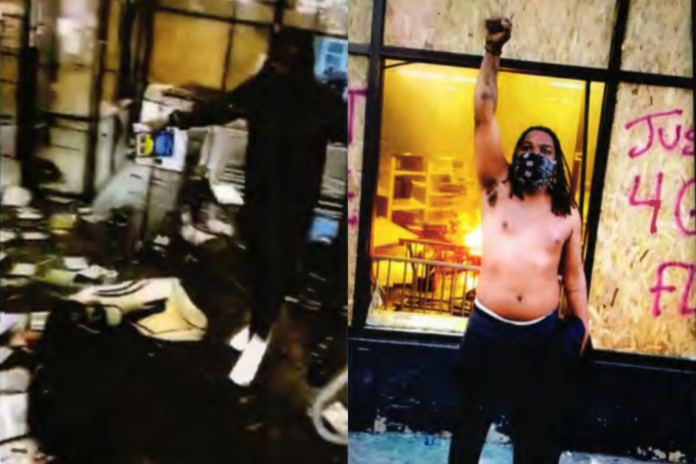
(American Greatness) — No matter how much the Biden regime and news media want Americans to forget what happened during the “social justice” protests of 2020, the public remembers. A poll taken last summer shows overwhelming support for investigations into the nationwide looting and rioting following the death of George Floyd, which caused an estimated $2 billion in damages and cost dozens of lives.
According to an analysis by a coalition of police chiefs, at least “8,700 protests occurred across 68 major cities … and 574 involved acts of violence,” in just a two-month span of 2020.
There is absolutely no comparison between the violence that terrorized the country throughout 2020 and the four-hour disturbance at the U.S. Capitol on January 6, 2021; any Democrat or Republican who equates the two events should be tossed out of office. (Here’s looking at you, Gov. Chris Sununu.)
And while top law enforcement officials fixate on the so-called “insurrection” they continue to downplay the murder and mayhem of 2020.
During a recent Senate Judiciary Committee hearing, Jill Sanborn, assistant director of the FBI’s national security branch, struggled to answer how many people face federal charges related to the 2020 riots. Sanborn admitted that the FBI has arrested “just north of 250 people” in connection with the “violence that we all saw around the peaceful protests,” as she described them.
Sanborn’s colleague, Assistant Attorney General Matthew Olsen, had an easier time detailing the number of arrests in the department’s sweeping Capitol breach probe. More than 700 January 6 protesters have been arrested so far, Olsen told the committee, and 325 face felony charges. (The total number of defendants now is more than 725 as the FBI arrests more January 6 protesters every week.)
Here’s what that means: Nearly three times as many Americans have been arrested for federal crimes in connection with January 6 than the number arrested for perpetrating the far more violent, deadly, and costly riots that lasted nearly four months, not four hours, in 2020.
Sanborn also wouldn’t tell Sen. Mike Lee how many 2020 rioters were subjected to military-style FBI raids or solitary confinement conditions in prison awaiting trial, the fate of hundreds of January 6 protesters. The answer, as Sanborn surely knows, is none.
What Sanborn and Olsen also don’t want to admit in public is that the Justice Department is actively dropping cases against 2020 rioters. Prosecutors continue to dismiss charges against Portland rioters; in December, the U.S. attorney in Portland asked a court to dismiss an indictment against a transgender rioter accused of using a high-powered laser against multiple police officers during Antifa’s 100-night siege of that city.
Nearly all rioting charges against protesters who occupied Lafayette Square in 2020 — which prompted the lockdown of the nearby White House and included attacks on law enforcement — have been dropped by the same U.S. attorney’s office in D.C. now prosecuting January 6 trespassers. Last July, prosecutors dismissed charges against a Black Lives Matter protester indicted by a grand jury for attacking federal officers in Lafayette Square in June 2020.
Now, the Justice Department is asking for leniency for the few 2020 rioters actually facing federal charges.
Take, for example, the case of Montez Lee, Jr. On May 28, 2020, Lee, a Black Lives Matter protester, broke into Max It Pawn Shop in Minneapolis, poured gasoline throughout the store, and set it on fire.
A few days later, the mother of Oscar Stewart contacted law enforcement to report her son missing. Stewart’s abandoned car was parked next to the pawn shop. It took authorities several weeks to identify the charred remains of Stewart, another black man, found inside the shop. The Hennepin County coroner ruled Stewart’s death a homicide. (It’s unclear if Stewart was a fellow rioter or an employee.)
Justice Department prosecutors, however, did not agree with that conclusion: Lee was charged with arson, not murder. And despite a lengthy criminal record including assault and burglary, the government offered Lee a deal to plead guilty to one count of arson, which he accepted in July.
Based on sentencing guidelines, the Justice Department calculated that the judge could sentence Lee to up to 240 months in prison. But a federal prosecutor asked the court to slice nearly eight years off his jail time. Why? Because Lee, unlike the government’s view of January 6 defendants, was engaged in a political protest those now in charge deem commendable.
“Lee credibly states that he was in the streets to protest unlawful police violence against black men, and there is no basis to disbelieve this statement,” Assistant U.S. Attorney Thomas Calhoun-Lopez wrote in November. “There appear to have been many people in those days looking only to exploit the chaos and disorder in the interests of personal gain or random violence. There appear also to have been many people who felt angry, frustrated, and disenfranchised, and who were attempting, in many cases in an unacceptably reckless and dangerous manner, to give voice to those feelings. Mr. Lee appears to be squarely in this latter category.”
Calhoun-Lopez further argued against the judge considering deterrence in Lee’s case since “the events of late May of 2020 were informed by forces that have been present in this country since its inception.”
Therefore, the government concluded, Lee should be sentenced to 144 months in prison rather than 240 months.
But even that sentence was too long for Judge Wilhelmina M. Wright, a Minnesota district court judge appointed by Barack Obama in 2016. Wright, now a leading candidate to replace Justice Stephen Breyer on the Supreme Court, instead sentenced Lee to 120 months in prison. “You are more than the person that destroyed that business by fire,” Wright told Lee in court on January 14. “You are more than the person who set that fire that killed a man.”
Federal prosecutors and judges have no similar sympathies for January 6 protesters. To the contrary, the Justice Department and D.C. District Court judges consider Americans charged with low-level misdemeanors on January 6, 2021 to be domestic terrorists.
For example, Jacob Chansley, the so-called QAnon shaman, pleaded guilty to one count of obstruction last summer after spending 317 days in solitary confinement. Chansley committed no violent crime on January 6 — in fact, he was allowed into the building and chatted with police — and is a veteran with no criminal record.
But the very same Justice Department that wanted mercy for Montez Lee asked a federal judge to sentence Chansley to 51 months in prison.
Further, unlike in Lee’s case, prosecutors wanted the judge to throw the book at Chansley as a deterrence measure. “The need to deter others is especially strong in cases involving domestic terrorism, which the breach of the Capitol certainly was,” Assistant U.S. Attorney Kimberly Paschall wrote the very same month her colleagues in Minnesota argued against deterrence in Lee’s case. “The demands of general deterrence weigh strongly in favor of incarceration, as they will for nearly every case arising out of the violent riot at the Capitol.”
Got that, America? A four-hour chaotic disturbance, likely instigated and/or encouraged by government agencies, is an act of domestic terror but months of destruction, murder, looting, arson, and vicious attacks on police, business owners, and innocent citizens is merely the “language of the unheard,” as the Justice Department claimed in Lee’s case.
Biden’s prosecutors may be fooling themselves — and federal judges auditioning for a promotion — but they are not fooling the majority of Americans. What happened throughout 2020 was unequivocally an act of domestic terrorism, a crime for which the Justice Department is wholly uninterested in fairly prosecuting.
Julie Kelly
Julie Kelly is a political commentator and senior contributor to American Greatness. She is the author of "Disloyal Opposition: How the NeverTrump Right Tried ― And Failed ― To Take Down the President." Her past work can be found at The Federalist and National Review. She also has been featured in the Wall Street Journal, The Hill, Chicago Tribune, Forbes, and Genetic Literacy Project. She is the co-host of "Happy Hour podcast with Julie and Liz." She is a graduate of Eastern Illinois University and lives in suburban Chicago with her husband and two daughters.










